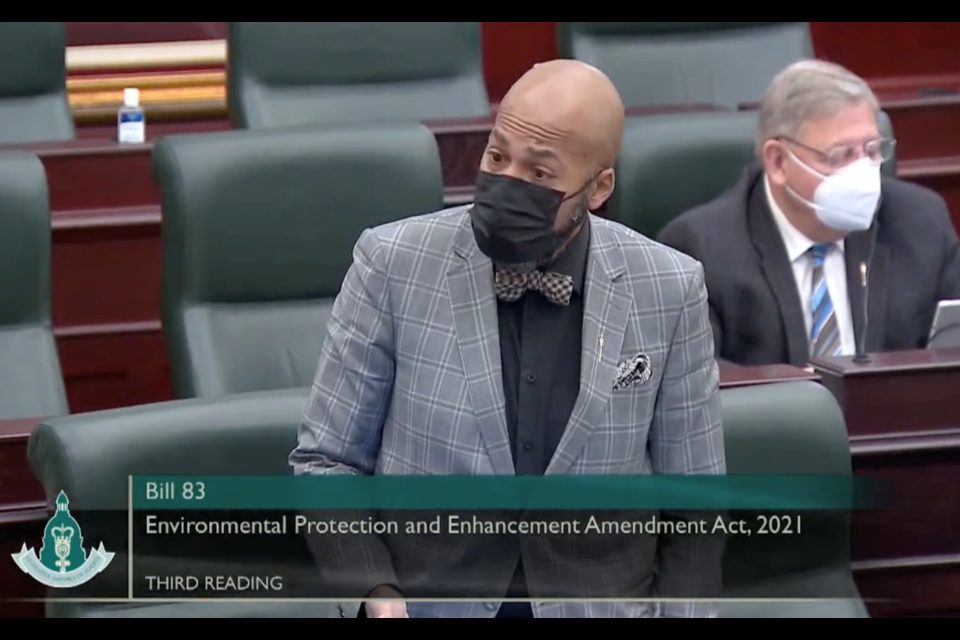LAKELAND, ALTA – Alberta sends more garbage than any other Canadian jurisdiction directly to landfills – about 1,034 kg per person of waste is sent to municipal landfills annually, according to the Government of Alberta.
Canada’s national average of disposed waste per person is 710 kg.
Alberta’s growing waste problem is one of the reasons the UCP government introduced Bill 83 the Environmental Protection and Enhancement Amendment Act.
“Right now, and for too long, municipalities and taxpayers have been shouldering the burden of collecting, sorting, processing and recycling waste,” said Jason Nixon, the Minister of Environment and Parks, during a press conference prior to the bill being passed on Nov. 25, 2021.
“We’re moving Alberta forward with legislation that will make producers of the waste responsible for the system in a way that creates a big opportunity to diversify the plastics economy.”
At the time, the provincial government acknowledged that Alberta’s current legislation and regulations for waste management and recycling have not kept pace with other Canadian jurisdictions, specifically regarding an Extended Producer Responsibility (EPR) framework.
An EPR framework is intended to shift the physical and financial responsibility of recycling waste to industry and packaging producers and away from local governments and taxpayers, who ultimately pay the price of disposing waste at the end of a products lifecycle.
Alberta is currently the only province without EPR systems.
When introducing Bill 83, UCP members stated the bill would enable the development of such a framework while supporting innovation and creating jobs through new provincial systems for managing single-use plastics, packaging and paper products, as well as hazardous and special products.
However, when the bill reached third reading and was passed in November, Bill 83 only incorporated two additional clauses to be included in the overarching Environmental Protection and Enhancement Act.
The additional clauses, X.1 and Z.1, create an exemption pathway to opt out of any EPR system that has yet to be created.
Clause X.1 allows for “exempting any designated material, activity, industry, person or class of any of them from the application of all or any of the provisions of any regulations made under this section.”
Opposition supports Bill 83, but finds it lacking
This discrepancy of intent versus actual policy was noted by several members of the NDP opposition party during the bill’s third reading.
“This bill does not implement an Extended Producer Responsibility framework but only a limited number of new exemptions. So it, again, creates more ways for people to opt out, but the problem that it seems people want solved is around reducing, reusing, and ultimately increased recycling opportunities and co-ordination between jurisdictions,” said NDP MLA Sarah Hoffman, referring to the amendments in Bill 83.
Hoffman emphasized Bill 83 was essentially “a commitment to develop a plan to make a plan.”
Hoffman also believes there are failures of Canadian recycling attempts overall.
“We are far too reliant on Asian countries to take our waste and to find ways for them to reuse it, and that in many situations we’ve seen it being rejected and sent back,” she said.
“What an absolute waste that we have put the effort into gathering these materials, consolidating them, shipping them – all of this is waste inducing... Then having those products arrive and then have them, in turn, sent home because many Asian countries don’t want our garbage. We’ve been so ineffective in how we actually engage in recycling in the west, and probably the whole world, to be frank.”
Lost revenue generation
Adding to the discussion, NDP MLA David Shepherd stated that Alberta’s delay in forming its own EPR framework is causing the province to lose out on funding that could be applied locally.
“We already have producers paying, as of 2016, more than $367 million to fund EPR paper and packaging programs in other provinces, something Albertans have been contributing to through their own purchases but have not been seeing any of the benefits of,” said Shepherd.
“It is, on the whole, a good concept and one that, unfortunately, Alberta is a bit late to the party on.”
Highlighting information from the Recycling Council of Alberta, Shepherd stated that an EPR paper and packing program could save Alberta municipalities between $65 million and $70 million annually on recycling management.
Too little too late
During previous readings of the bill, NDP MLA Richard Feehan offered suggestion that could have been folded into Bill 83 beyond the two clauses, including product fees, references to advanced recycling fees, product take-back mandates with recycling rate goals, recycling subsidies and even virgin material taxes to reduce the use of non-recycled material.
“I certainly have tried to bring forward a number of respectful suggestions for the government to include in the bill, and unfortunately we’re finding ourselves at third reading with no alteration whatsoever to the bill,” Feehan stated.
The lack of an EPR framework and the delay in creating one is having a significant impact on municipalities, he says.
“We have a very big problem of waste in rural communities and small towns, where they are running out of garbage space. The cost of establishing new disposal sites is extremely high, and that is being paid for by their citizens, who often had no benefit of the private enterprise exchange that created the problem. No benefit at all.”
The possible future economic benefits from increased recycling are $1.4 billion injected into the economy and upwards of 13,300 jobs supported, indicated UCP MLA Searle Turton, who based the numbers off the province’s natural gas vision and strategy.
That is double the number of jobs and economic injections compared to Alberta’s current recycling program.



